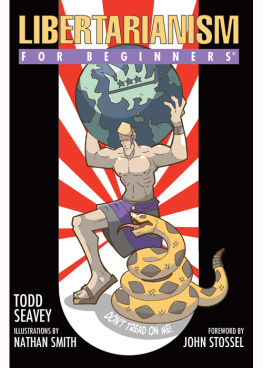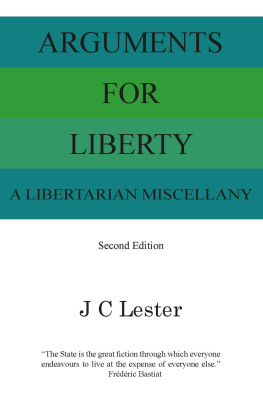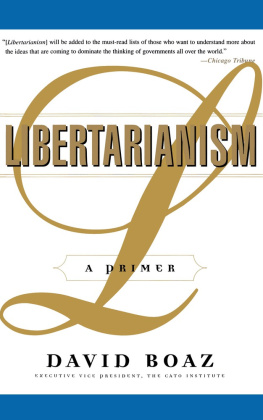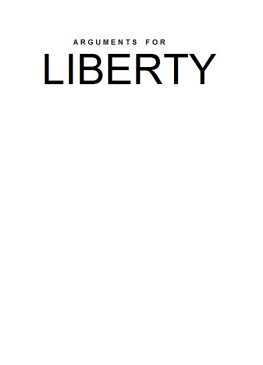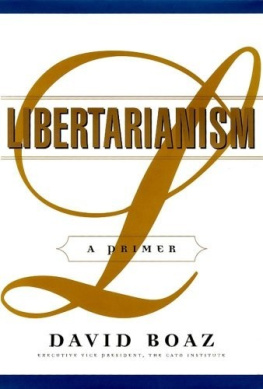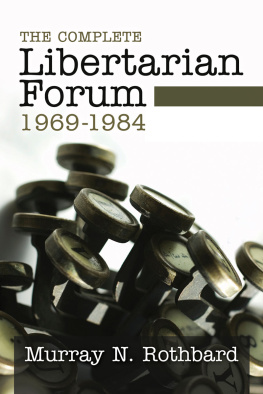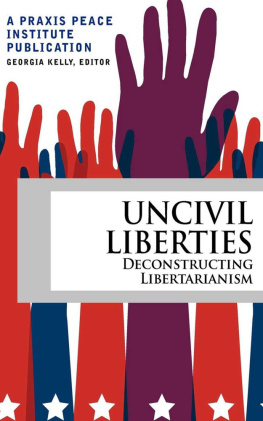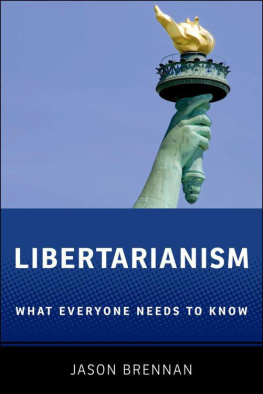Thank you for downloading this Simon & Schuster eBook.
Join our mailing list and get updates on new releases, deals, bonus content and other great books from Simon & Schuster.
C LICK H ERE T O S IGN U P
or visit us online to sign up at
eBookNews.SimonandSchuster.com
Contents
Preface to the New Edition
Libertarianism is hot, headlined the Washington Post in 2013. From an almost-forgotten part of American political culture, libertarianism has grown into a respected and much-discussed political faction and a compelling set of ideas that challenge the conventional wisdom. Tens of millions of Americans are fiscally conservative, socially tolerant, and skeptical of American military interventionand more of them see themselves as libertarian.
The recent and rapid growth of the libertarian movement is a product of two things: the spread of libertarian ideas and sentiments, and a response to the expansion of government during the Bush and Obama administrations, particularly the civil liberties abuses after 9/11 and the bailouts and out-of-control spending after the financial crisis. As one journalist noted in 2009, The Obama administration brought with it ambitions of a resurgence of FDR and LBJs active-state liberalism. And with it, Obama has revived the enduring American challenge to the state.
That libertarian revival manifested itself in several ways. Sales of books like Atlas Shrugged and The Road to Serfdom soared. Rallies against taxes, debt, bailouts, and ObamaCare drew a million or more people to hundreds of protests. Crony capitalism became a target for people across the political spectrum. Marijuana legalization and marriage equality made rapid progress. More people than ever told Gallup in 2013 that the federal government has too much power.
In studies that I have coauthored on the libertarian vote, we have found that some 2 to 4 percent of Americans say that theyre libertarian when asked. But 15 to 20 percent30 to 40 million Americanshold libertarian views on a range of questions. The latest Gallup Governance Survey finds 25 percent of respondents falling into the libertarian quadrant, matching the number of conservatives and liberals and up from 17 percent in 2004 and 23 percent in 2008. And when asked if they would define themselves as fiscally conservative and socially liberal, also known as libertarian, fully 44 percent of respondents100 million Americansaccept the label. Those voters are not locked into either party, and politicians trying to attract the elusive swing vote should take a look at those who lean libertarian.
In two presidential campaigns Representative Ron Paul attracted hundreds of thousands of followers to his combination of antiwar, antispending, and sound-money (End the Fed) ideas, and showed them that those views were libertarian. Two national student organizations now take libertarian ideas to thousands of college campuses in the United States and well beyond.
This revised edition is for those leaning toward libertarian views and anyone looking to understand the changes in American political thought.
Libertarianism, a belief in what Adam Smith called the obvious and simple system of natural liberty, is the core philosophy of America. The first colonists fled aristocratic Europe to find religious liberty, individualism, and economic opportunity. They declared their belief in life, liberty, and the pursuit of happiness. American history has been a struggle between liberty and power, between those who wanted to defend and extend the liberties guaranteed in the Constitution and those who wanted to make the United States more like the countries our ancestors left, with powerful and paternalistic government. Throughout our history libertarian sentiments have been rekindled when the federal government grew beyond what Americans would toleratesuch as in the past few years.
The title of this revised book, The Libertarian Mind , reflects the spread of the libertarian perspective. Ive tried to present libertarian ideasincluding individualism, pluralism, toleration, law and the Constitution, economic freedom, and civil societyin a contemporary context, and in a readable but substantive way. I also include a short history of libertarian thought from ancient Greece to F. A. Hayek and Robert Nozick.
Throughout The Libertarian Mind I argue for this point with which I conclude: The simple, timeless principles of the American Revolutionindividual liberty, limited government, and free marketsare even more powerful and more important in this world of instant communication, global markets, and unprecedented access to information than Jefferson or Madison could have imagined. Libertarianism is not just a framework for utopia, it is the indispensable framework for the future.
Chapter 1
The Coming Libertarian Age
Libertarianism is the philosophy of freedom. Its the philosophy that has in different forms inspired people throughout history who fought for freedom, dignity, and individual rightsthe early advocates of religious tolerance, the opponents of absolute monarchy, the American revolutionaries, the abolitionists, antiwar and anti-imperialist advocates, opponents of National Socialism and communism.
Libertarians believe in the presumption of liberty. That is, libertarians believe people ought to be free to live as they choose unless advocates of coercion can make a compelling case. Its the exercise of power, not the exercise of freedom, that requires justification. If we followed the presumption of liberty, our lives would be freer, more prosperous, and more satisfying.
The burden of proof ought to be on those who want to limit our freedom.
We should be free to live our lives as we choose so long as we respect the equal rights of others. The presumption of liberty should be as strong as the presumption of innocence in a criminal trial, for the same reason. Just as you cant prove your innocence of all possible charges against you, you cannot justify all of the ways in which you should be allowed to act.
But too often were told that we have to justify each exercise of our freedom. Want to add a room onto your house? Smoke marijuana? Own a gun? Surf the Internet in privacy? Open a new taxi company? Prove that you need such a freedom.
When New York mayor Michael Bloomberg tried to impose a ban on sodas larger than sixteen ounces, nanny-state activists proclaimed that no one needs a large soda. Maybe not, but what if they want one? Dont people have a right to choose what they eat and drink? Former senator Richard Lugar said that he wanted to ban certain firearms for which I see no legitimate social purpose. What other products might not have a legitimate social purposecigarettes? Electric toothbrushes? Light beer? Politicians autobiographies? In a free society politicians and political majorities shouldnt be arbiters of what can be sold by willing sellers to willing buyers.
Similarly, defenders of massive surveillance of our phone calls and web surfing demand that we make the case for our freedom and privacy. They are wrong. The burden of proof should be on those who would compile sweeping databases of our activities. Liberty should be the presumption. Restrictions on liberty need justification.
We do get exercised about limits on our freedom, but not often enough. Just look at the restrictions government has imposed on us. Government takes as much as half the money we earn. It tells us where to send our children to school and how to save for retirement. It tells us what we may eat, drink, and smoke. It tells us whether we may marry the person we love.


